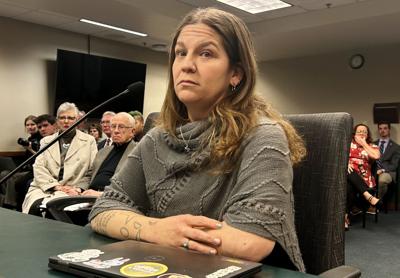
Jamie Reed, a former case manager at the Washington University Transgender Center, was among witnesses testifying on transgender-related legislation at a Missouri House committee meeting on Wednesday, Jan. 17, 2024.
JEFFERSON CITY ŌĆö A former case manager for the Washington University Transgender Center served as the stateŌĆÖs star witness Monday in defense of restrictions on gender-affirming medical practices.
Jamie Reed, the former employee who left in late 2022 after working there more than four years, went public with concerns in early 2023 about the clinic.
She said doctors were medically intervening without parental consent, that puberty blockers and hormones were prescribed without adequately addressing mental health issues, and that the clinic regularly referred patients younger than 18 for surgery.
ReedŌĆÖs account ŌĆö which she shared with the Missouri attorney general and in the news media ŌĆö helped drive lawmakers to enact a law in 2023 restricting gender-affirming hormones, puberty blockers and surgeries for minors. Medicaid payments for adults for the treatments were also blocked.
People are also reading…
Reed, on Monday, said an investigation by Washington University after her complaints confirmed the clinic wasnŌĆÖt collecting custody documents or seeking written consent.
The university reported in April 2023 that a ŌĆ£more detailed and formalized approachŌĆØ was needed to document parental consent, including earlier evidence of custody agreements.
Washington University also acknowledged minors could be referred for surgery prior to 2019, before the school changed its policy. It said that six chest surgeries took place for adolescents transitioning to males.
Reed testified Monday that some of the centerŌĆÖs patients who had taken medications later decided to become ŌĆ£detransitionersŌĆØ after determining they no longer thought they were transgender.
ŌĆ£They told us, they emailed us and told us, I learned it from their parents,ŌĆØ she said, adding informed consent handouts didnŌĆÖt disclose this information.
Since the law took effect, Washington University said it would stop providing gender-affirming medications to minors who were technically eligible for the treatments under an exception in the law for minors already taking medications. The school cited ŌĆ£unacceptableŌĆØ legal liability contained in the law.
During cross-examination, an attorney for the plaintiffs raised doubts about ReedŌĆÖs expertise, confirming she didnŌĆÖt go to medical school and had never made a mental health diagnosis, among other things.
ReedŌĆÖs testimony Monday coincided with the release of an online column by her spouse, Tiger Reed, to taper off of testosterone and ŌĆ£begin the process of becoming a woman againŌĆØ after living 13 years as a man.
Reed said last year that she was married to a transgender man.
During the first week of trial, witnesses for the plaintiffs defended the provision of gender-affirming medical care for minors.
ReedŌĆÖs testimony Monday marked the start of the second week in the trial, which was scheduled to last through Friday.
Circuit Judge R. Craig Carter, who typically works in Douglas County, was assigned the case by the Missouri Supreme Court after plaintiffs requested another judge.
51║┌┴Ž Circuit Judge Steven Ohmer last August allowed the restrictions to take effect, saying plaintiffs didnŌĆÖt demonstrate a probability of success at trial.
Plaintiffs challenging the restrictions include three transgender minors and parents and Southampton Community Healthcare in 51║┌┴Ž. Two LGBTQ+ rights groups, PFLAG and GLMA, also are listed as plaintiffs.






















